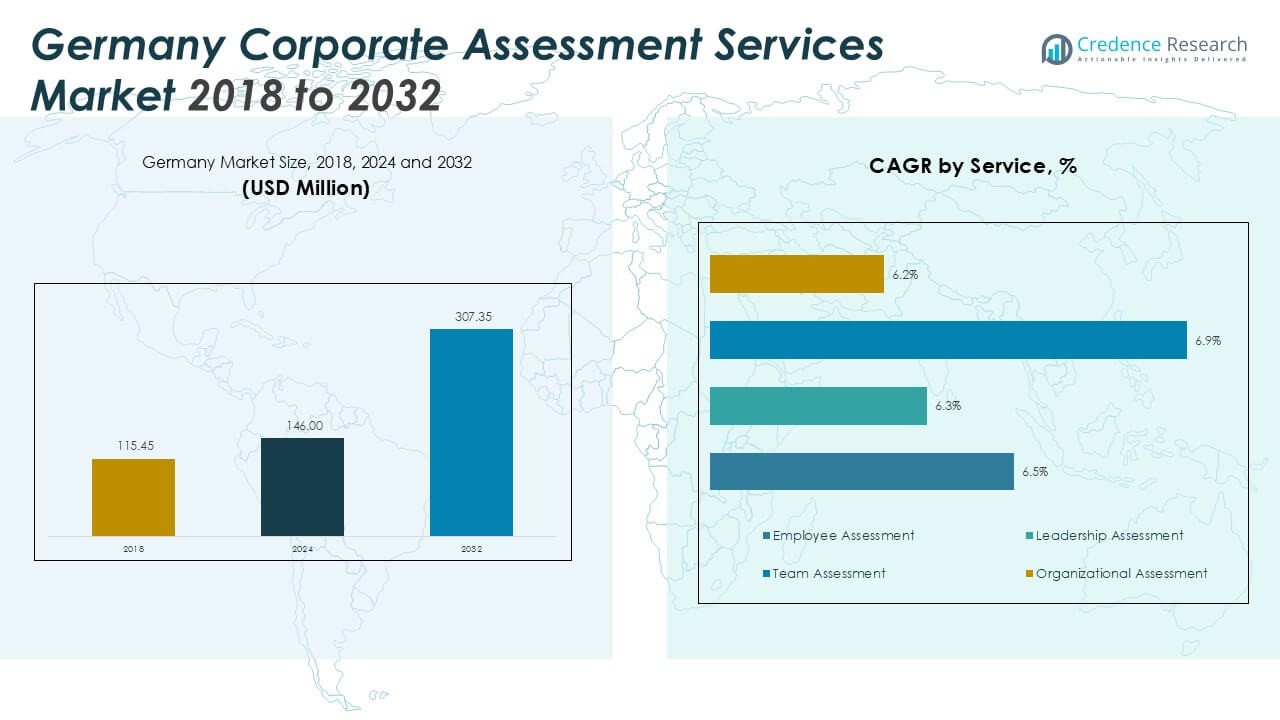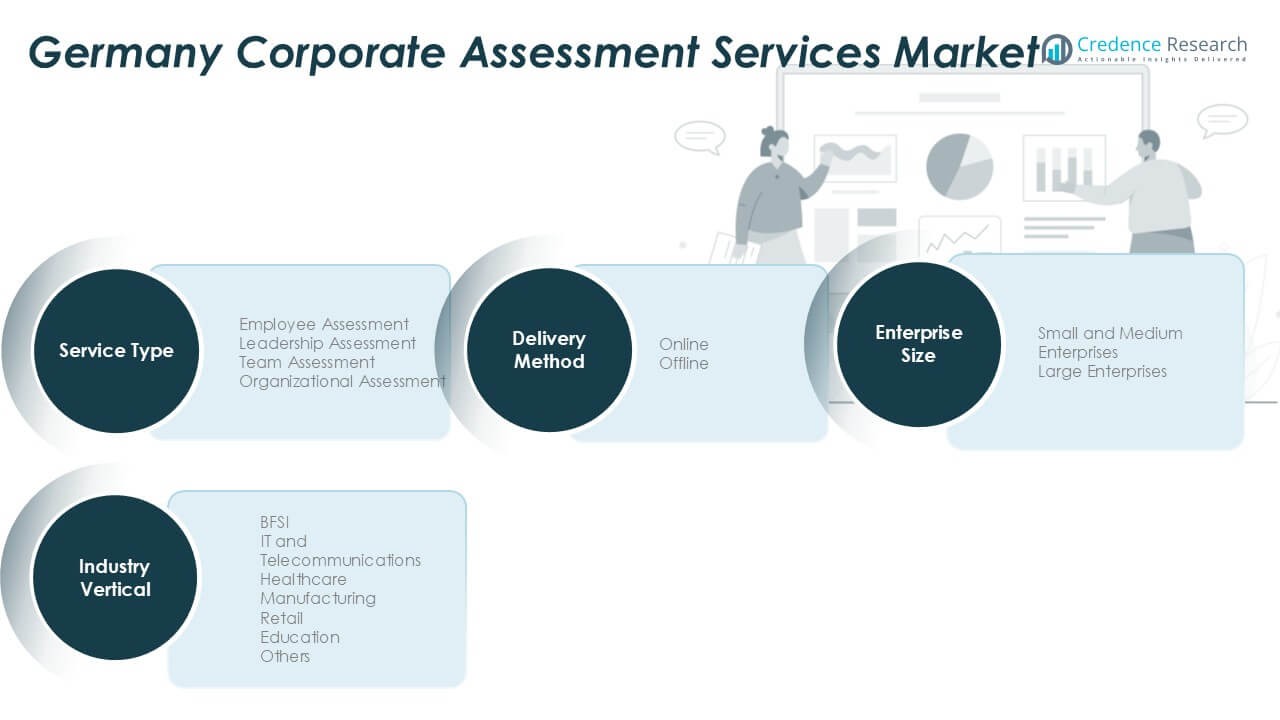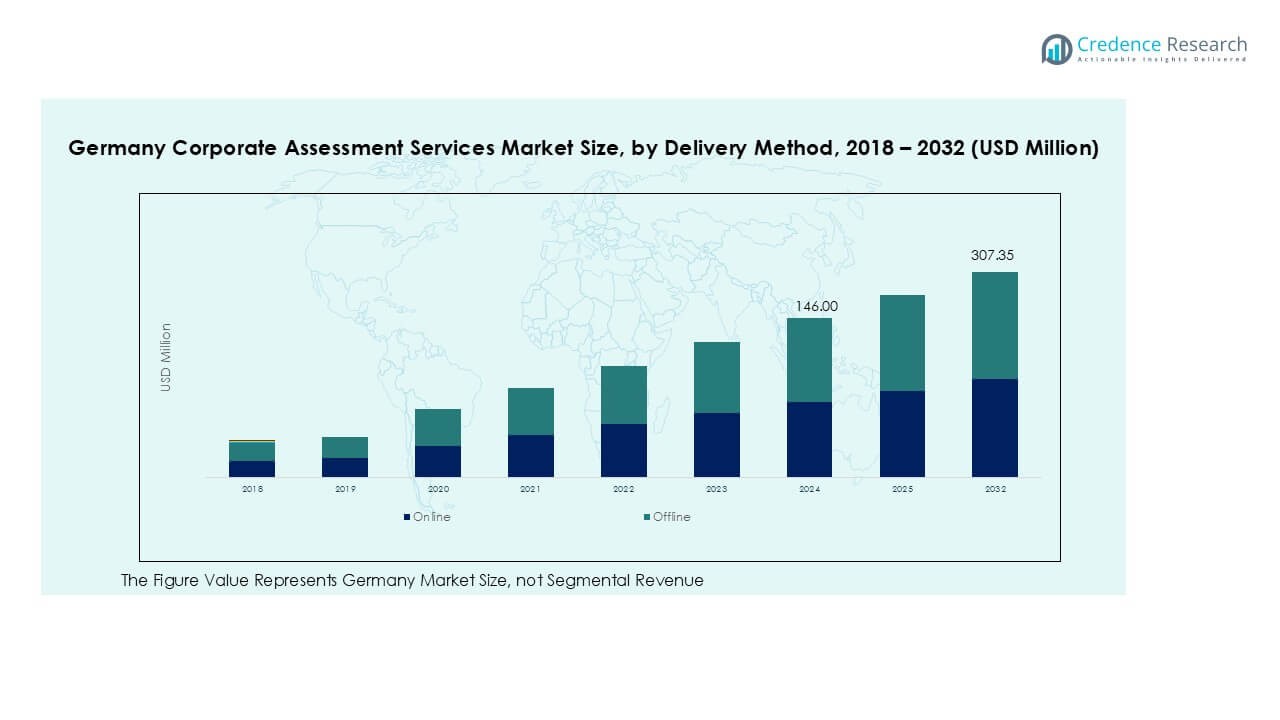Market Overview
Germany Corporate Assessment Services Market size was valued at USD 115.45 million in 2018 and grew to USD 146.00 million in 2024. It is anticipated to reach USD 307.35 million by 2032, registering a CAGR of 9.75% during the forecast period.
| REPORT ATTRIBUTE |
DETAILS |
| Historical Period |
2020-2023 |
| Base Year |
2024 |
| Forecast Period |
2025-2032 |
| Germany Corporate Assessment Services Market Size 2024 |
USD 146.00 Million |
| Germany Corporate Assessment Services Market, CAGR |
9.75% |
| Germany Corporate Assessment Services Market Size 2032 |
USD 307.35 Million |
The Germany corporate assessment services market is led by major players such as Korn Ferry, SHL Group Ltd., Aon plc, Hogan Assessments, and Thomas International. These companies dominate through advanced assessment tools, leadership evaluation programs, and AI-enabled analytics platforms. Korn Ferry and Aon specialize in large-scale leadership and organizational assessments, while SHL and Hogan focus on behavioral and psychometric testing. Thomas International continues to expand its presence through cloud-based assessment solutions targeting mid-sized firms. Regionally, Southern Germany accounted for the largest market share of 34% in 2024, driven by strong industrial activity and corporate investments in workforce evaluation and leadership development programs.
Access crucial information at unmatched prices!
Request your sample report today & start making informed decisions powered by Credence Research Inc.!
Download Sample
Market Insights
- The Germany Corporate Assessment Services market was valued at USD 146.00 million in 2024 and is projected to reach USD 307.35 million by 2032, growing at a CAGR of 9.75%.
- Growing demand for data-driven hiring and performance evaluation is driving adoption of employee assessment solutions, which held a 41% share in 2024.
- AI-enabled assessment platforms and predictive analytics are emerging as key trends, improving recruitment precision and leadership development.
- The market is moderately consolidated, with Korn Ferry, SHL Group, and Aon plc leading through digital innovation and strategic partnerships.
- Southern Germany dominated with a 34% share in 2024, followed by Northern Germany at 27%, while large enterprises accounted for 64% of total market revenue due to structured talent management programs.
Market Segmentation Analysis:
By Service Type
Employee assessment dominated the Germany corporate assessment services market with a 41% share in 2024. This dominance is driven by the growing emphasis on data-backed hiring and performance evaluations across enterprises. Companies are increasingly using psychometric and behavioral tests to enhance recruitment quality and workforce productivity. Leadership assessment is also gaining traction as organizations invest in developing future leaders. Rising digital adoption and integration of AI-based assessment platforms further strengthen the segment’s growth, improving accuracy and scalability of evaluation processes across industries.
- For instance, HOGREFE Consulting (a German test publisher) offers over 100 assessment instruments for selection and development use.
By Industry Vertical
The BFSI sector held the largest share of 32% in 2024 within the Germany corporate assessment services market. The dominance is attributed to strong regulatory compliance needs and high recruitment volumes in the financial services sector. The IT and telecommunications industry follow closely, driven by skill-based hiring and leadership benchmarking programs. Healthcare and manufacturing sectors are also expanding due to increasing focus on employee competency mapping and safety compliance. Continuous digital transformation and workforce optimization initiatives across these verticals are fueling segment growth.
- For instance, Morgan Philips, including its Germany-based division, utilizes psychometric assessments and competency profiling as part of its talent consulting services. These services are used for selection, potential identification, and leadership development.
By Enterprise Size
Large enterprises accounted for 64% of the Germany corporate assessment services market in 2024, leading the segment landscape. Their dominance stems from structured recruitment processes, frequent talent evaluations, and the use of customized assessment solutions. These organizations are investing heavily in analytics-driven performance tools to improve leadership pipelines and retention. Meanwhile, small and medium enterprises are rapidly adopting cost-efficient online platforms for employee evaluation. The increasing accessibility of cloud-based assessment tools and growing awareness about structured hiring practices are driving growth among SMEs.

Key Growth Drivers
Rising Emphasis on Data-Driven Recruitment
German organizations are increasingly shifting toward data-driven recruitment and workforce management practices. Companies are adopting psychometric, cognitive, and behavioral assessment tools to reduce hiring bias and improve candidate selection accuracy. This approach supports evidence-based decision-making, enhancing employee retention and performance alignment. The growing need for standardized evaluations across hybrid work models further drives adoption. Integration of AI and machine learning algorithms enables predictive talent analytics, allowing employers to identify high-potential employees efficiently. As competition for skilled talent intensifies, data-backed assessment tools have become central to corporate HR strategies, strengthening market expansion across sectors.
- For instance, the German HR software firm Personio reported managing more than 1 million employees across its customer base in 2024.
Growing Focus on Leadership and Organizational Development
The rising demand for leadership assessment and succession planning is a key growth driver in Germany’s corporate assessment services market. Large enterprises are investing in strategic leadership evaluation programs to build resilient management teams. These assessments measure emotional intelligence, problem-solving skills, and adaptability—qualities essential for organizational stability and innovation. With many industries facing skill shortages and leadership transitions, structured leadership development programs are gaining prominence. Additionally, German corporations are integrating psychometric evaluations into training initiatives to enhance internal mobility. The trend aligns with the country’s strong emphasis on long-term workforce sustainability and continuous performance improvement, fueling sustained demand.
- For instance, Deutsche Telekom’s “levelUP!” leadership development program added 4,000 new users in one year, reaching over 8,500 leaders in total, and delivered 425 live sessions with more than 9,000 booked spots.
Increased Adoption of Digital Assessment Platforms
The widespread integration of digital technologies in corporate HR systems has accelerated the demand for online assessment solutions. German companies are adopting AI-powered platforms that offer real-time analytics, automated scoring, and customized testing modules. These systems improve scalability, reduce administrative burden, and ensure standardized evaluation across multiple locations. The COVID-19 pandemic further boosted demand for virtual assessment tools as remote hiring and digital onboarding became standard practice. Integration with applicant tracking systems (ATS) and learning management systems (LMS) also enhances process efficiency. As organizations prioritize agility and digital transformation, the adoption of virtual assessments continues to expand, reshaping the corporate evaluation landscape.
Key Trends & Opportunities
AI-Enabled and Predictive Analytics Assessments
Artificial intelligence is transforming the assessment landscape by enhancing accuracy and personalization. German enterprises increasingly use AI-driven tools to evaluate cognitive skills, behavior patterns, and job suitability. Predictive analytics models help identify potential leaders and forecast long-term performance outcomes. AI also reduces human bias and speeds up decision-making, supporting equitable recruitment. Moreover, integration of natural language processing (NLP) enables deeper analysis of communication and situational responses. The trend opens opportunities for solution providers to develop intelligent assessment frameworks that align with evolving organizational needs, driving long-term technological innovation within the German market.
- For instance, the German AI startup Aleph Alpha developed its Luminous large language model, which is used for analysis, including nuanced language, in private enterprise and government projects. In 2024, the company announced several new products and partnerships to expand the use of its technology, including a system for public sector applications.
Expanding Demand from SMEs and Nontraditional Sectors
Small and medium enterprises (SMEs) in Germany are becoming a major growth opportunity for corporate assessment service providers. With increasing digital literacy and affordable cloud-based tools, SMEs now access professional assessment systems once limited to large corporations. The manufacturing, education, and healthcare sectors are showing notable demand for workforce evaluation tools to manage skill development and compliance. Moreover, the government’s digitalization initiatives are encouraging smaller enterprises to adopt HR technology solutions. Service providers offering flexible pricing and multilingual assessment platforms are well-positioned to capture this growing demand from emerging business segments.
Key Challenges
Data Privacy and Compliance Constraints
Stringent data protection regulations, such as the EU General Data Protection Regulation (GDPR), pose a significant challenge for assessment service providers in Germany. Corporate assessments often involve collecting sensitive employee information, which demands strict compliance with privacy and storage standards. Any breach or noncompliance can lead to legal repercussions and reputational damage. Providers must ensure secure data encryption, consent management, and transparent data handling practices. Implementing these systems increases operational complexity and cost. Balancing personalization with compliance remains a key obstacle, especially for multinational firms operating across varied regulatory frameworks.
Resistance to Technology Adoption and Change Management
Despite digital advancements, resistance to technology adoption among traditional organizations remains a barrier to market growth. Many HR departments continue to rely on manual evaluations and in-person interviews, limiting the penetration of digital assessment platforms. The shift to automated tools requires process reengineering, staff training, and investment in digital infrastructure. Some organizations also express concerns about algorithmic bias and over-reliance on AI for decision-making. Overcoming these challenges demands awareness programs, transparent methodologies, and evidence of measurable efficiency gains. Vendors that offer human-AI hybrid models and user-friendly platforms are better positioned to overcome this resistance.

Regional Analysis
Northern Germany
Northern Germany accounted for 27% of the corporate assessment services market in 2024. The region’s strong concentration of technology, logistics, and finance companies drives high demand for workforce evaluation solutions. Major business hubs such as Hamburg and Bremen are adopting digital assessment platforms to improve hiring precision and leadership identification. The growing presence of multinational corporations also supports advanced leadership and organizational assessment programs. Rising investments in AI-based HR analytics and digital recruitment tools further accelerate adoption, positioning Northern Germany as a key contributor to the market’s national expansion.
Southern Germany
Southern Germany dominated the corporate assessment services market with a 34% share in 2024. The region’s strong industrial base, led by automotive and engineering firms in Bavaria and Baden-Württemberg, creates significant demand for skill-based assessments and performance benchmarking. Large enterprises emphasize structured recruitment, leadership development, and succession planning, boosting adoption of digital assessment platforms. Universities and research-driven institutions in Munich and Stuttgart are also collaborating with HR tech providers to enhance employee evaluation systems. Strong economic performance and workforce modernization efforts make Southern Germany a vital growth hub for corporate assessment services.
Western Germany
Western Germany captured a 24% market share in 2024, driven by its robust corporate and service sector presence. Cities like Cologne, Düsseldorf, and Frankfurt house many financial and consulting firms that actively use employee and leadership assessment tools. The region’s workforce diversification and international corporate headquarters foster a demand for multilingual, AI-enabled evaluation platforms. Additionally, Western Germany’s emphasis on compliance, governance, and cultural fit assessments enhances market maturity. Strong digital infrastructure and enterprise-level HR modernization continue to drive the region’s role as a dynamic contributor to Germany’s overall assessment services landscape.
Eastern Germany
Eastern Germany held a 15% market share in the corporate assessment services market in 2024. The region is witnessing steady adoption of digital assessment tools, particularly across growing manufacturing and education sectors. Cities like Leipzig and Dresden are emerging as new technology hubs, encouraging local enterprises to invest in workforce analytics and performance evaluation. Government initiatives promoting digitalization and skill development also support market expansion. While adoption rates remain moderate compared to Western and Southern regions, increasing awareness of employee competency mapping and leadership assessment is driving gradual market penetration in Eastern Germany.

Market Segmentations:
By Service Type
- Employee Assessment
- Leadership Assessment
- Team Assessment
- Organizational Assessment
By Industry Vertical
- BFSI
- IT and Telecommunications
- Healthcare
- Manufacturing
- Retail
- Education
- Others
By Enterprise Size
- Small and Medium Enterprises
- Large Enterprises
By Delivery Mode
By Geography
- Northern Germany
- Southern Germany
- Western Germany
- Eastern Germany
Competitive Landscape
The Germany corporate assessment services market features a moderately consolidated competitive landscape dominated by international players and a few specialized local firms. Leading companies such as Korn Ferry, SHL Group, Aon plc, and Hogan Assessments hold substantial market presence through diversified product portfolios and AI-driven platforms. These firms focus on expanding their digital and analytics capabilities to deliver personalized, scalable assessment solutions. Korn Ferry and SHL emphasize leadership and behavioral assessments, while Aon and Thomas International strengthen predictive analytics offerings. Emerging players like AssessFirst and Harrison Assessments are gaining traction with customizable and cost-efficient online tools targeting SMEs. Continuous innovation in psychometric testing, integration with learning systems, and adherence to GDPR compliance standards define competition in the market. Strategic collaborations, platform modernization, and mergers remain central to sustaining growth and enhancing service differentiation in Germany’s evolving corporate assessment landscape.
Shape Your Report to Specific Countries or Regions & Enjoy 30% Off!
Key Player Analysis
- Korn Ferry
- SHL Group Ltd.
- Aon plc
- Hogan Assessments
- Thomas International
- Saville Assessment
- PSI Services LLC (Cubiks)
- AssessFirst
- Harrison Assessments
- CEB (now Gartner)
- Talent Q (now part of Korn Ferry)
Recent Developments
- In 2023, IBM Corporation introduced AI-driven recruitment tools that assess behavioral patterns and predict job success. These tools leverage machine learning to minimize biases in recruitment processes, enhancing efficiency and fairness in candidate evaluation
- In 2023, Mercer Mettl Launched the “Mercer|Mettl Online Assessments,” an AI-powered platform to evaluate soft skills, technical competencies, and cognitive abilities. It includes advanced proctoring features for remote hiring and corporate training, emphasizing test security and scalability.
Report Coverage
The research report offers an in-depth analysis based on Service Type, Industry Vertical, Enterprise Size, Delivery Mode and Geography. It details leading market players, providing an overview of their business, product offerings, investments, revenue streams, and key applications. Additionally, the report includes insights into the competitive environment, SWOT analysis, current market trends, as well as the primary drivers and constraints. Furthermore, it discusses various factors that have driven market expansion in recent years. The report also explores market dynamics, regulatory scenarios, and technological advancements that are shaping the industry. It assesses the impact of external factors and global economic changes on market growth. Lastly, it provides strategic recommendations for new entrants and established companies to navigate the complexities of the market.
Future Outlook
- Digital transformation will accelerate adoption of AI-driven and cloud-based assessment platforms.
- Demand for leadership and behavioral assessments will rise across large organizations.
- SMEs will increasingly invest in cost-effective online evaluation tools.
- Integration of predictive analytics will enhance workforce planning and hiring accuracy.
- Compliance with data privacy regulations will shape platform design and data handling.
- Hybrid and remote work models will boost demand for virtual assessment solutions.
- Partnerships between HR tech providers and enterprises will expand service reach.
- Gamified and adaptive testing methods will improve candidate engagement and experience.
- Growing focus on employee well-being will drive inclusion of emotional intelligence metrics.
- Southern Germany will continue to lead market growth, supported by industrial and corporate expansion.






